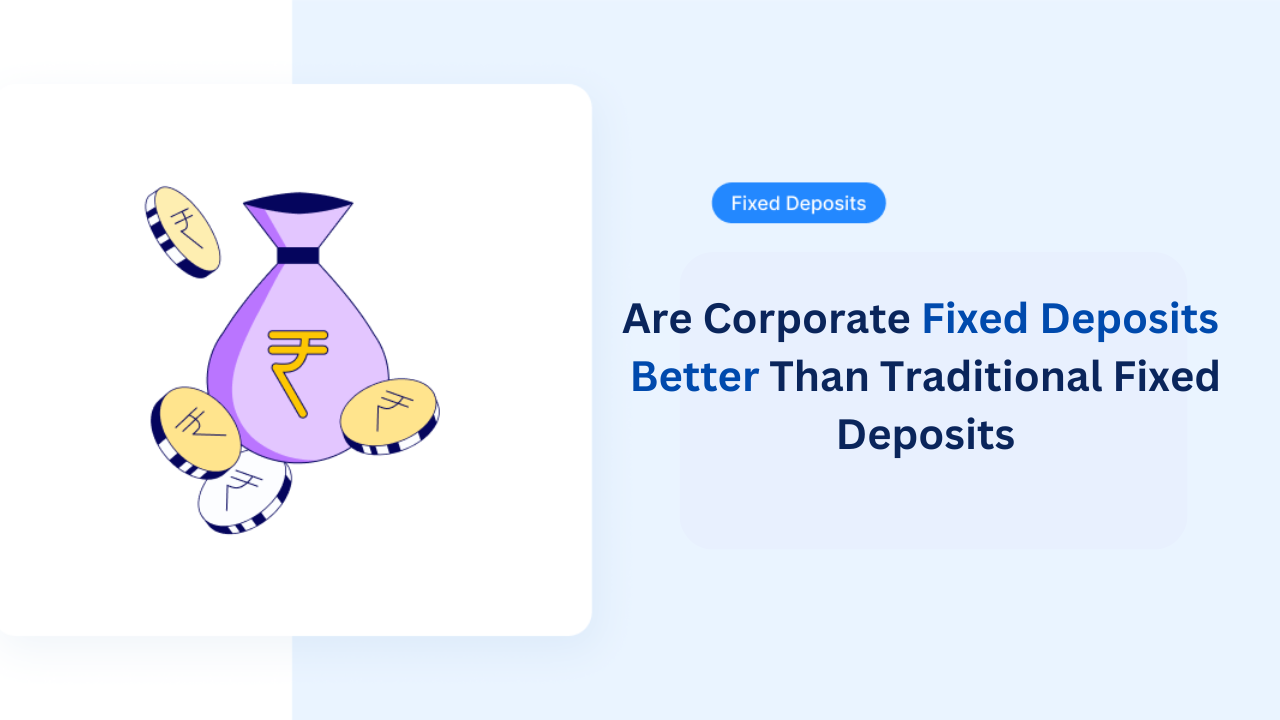Fixed deposits are amongst India’s most loved investments. India currently has ₹103 trillion saved across 24.23 million deposits. A survey revealed that almost half of the 1.6 million investors chose FDs when they needed money within 3 years with safety.
Fixed deposits are widely loved by Indians because they offer a fixed rate of interest (higher than savings account interest rates), they are reliable, offer liquidity and allow investors to grow their wealth without added fear of risk. But there is a category within fixed deposits that Indians have not yet explored – Corporate Fixed Deposits. Let’s understand India’s best-kept investment secret with this blog!
What are Corporate Fixed Deposits?
Corporate fixed deposits, also known as company fixed deposits, are offered by financial institutions like Non-Banking Financial Corporations (NBFCs) and Housing Finance Companies (HFCs). Shriram Finance, Bajaj FinServ, Mahindra Finance, LIC Housing Finance and PNB Housing Finance are some prominent companies that offer corporate fixed deposits to Indian investors. They are not issued by commercial banks. Here are some features of corporate fixed deposits:
- Higher Returns: You can enjoy higher interest rates compared to bank FDs. Corporate FDs offer over 9% interest rates.
- Flexible Interest Payouts: Earn interest at every interval. You can choose monthly, quarterly, annually, or at maturity as your payout option.
- Principal and Interest Repayment: Get your principal and accumulated interest at maturity for maximum payout.
- Maturity: Invest for a fixed period, ranging from a few months to several years.
- Affordable Investment: The minimum investment amount starts at ₹1000 to ₹5000 for most institutions.
- Special Offers: Senior citizens and women can earn special returns on these investments. They get an additional 0.25 to 0.50 depending on the institution.
- Loan Collateral: Use your fixed deposit as security to access loans when in need and if your provider offers the facility.
- Easy Liquidity: Corporate FDs do have a lock-in period, yet they are generally considered liquid investments. You can withdraw your money at any time.
- Premature Withdrawal: Early withdrawal might incur a penalty for breaking the lock-in period.
- Credit Rating: Corporate FDs rated by companies like CRISIL, ICRA and CARE. The ratings can help you determine a deposit’s quality, performance and financial health.

Corporate Fixed Deposits vs Bank Fixed Deposits
The main difference between corporate and bank fixed deposits are the interest rates, risk factor and provider. Here’s the difference between corporate fixed deposits and bank fixed deposits:
| Feature | Corporate FDs | Bank FDs |
| Issued Authority | Non-Banking Financial Corporations and Housing Finance Companies | Public and Private Banks |
| Interest Rates | Higher Returns starting at 7-8% | Limited Returns starting at 3-6% |
| Risk Factor | Moderate | Low |
| Tenure | Flexible (12 months to 3 years) | Flexible (7 days to 10 years) |
| Minimum Deposit | ₹1000 -₹5000 (depending on the provider) | Starts at ₹1000 |
| Liquidity | Can withdraw with penalties | Can withdraw interest-free deposited amount |
| Special Offers | Senior citizens & women get addition interest rates for investing | Senior citizens & women get addition interest rates for investing |
| Eligibility | Indian investor above the 18 years of age | Indian investor above the 18 years of age |
| Safety | Not insured by any company | Insured by DICGC up to Rs. 5 lakh per depositor per bank. |
| Tax Liability | Tax Deducted at Source (TDS) at 10% if the interest income exceeds Rs. 40,000 in a financial year. TDS is deducted irrespective of your income level for corporate FD holders. | Tax Deducted at Source (TDS) at 10% if the interest income exceeds Rs. 40,000 in a financial year. There is an option to submit Form 15G or 15H to avoid TDS if your total income is below the taxable limit. |
Benefits of Investing in Corporate Fixed Deposits
Corporate fixed deposits are a valuable addition to your portfolio because of their ability to yield higher interest rates. These deposits offer an edge over bank fixed deposits and allow you to save bigger amounts in the short duration. This is an opportunity to diversify your portfolio and keep up with inflation in terms of long-term goals like your child’s education costs. The biggest benefit of investing in corporate fixed deposits is that the higher returns; you can get 7-8% interest rates on your deposited amount as compared to 3-6% with bank FDs. Let’s examine the benefits closely with this listicle:
- Higher Returns: Corporate FDs offer higher interest rates than bank FDs and recurring deposits. These rates start at 7-8% depending on your provider.
- Flexible Tenure: Investors can choose how long they wish to stay invested. The tenure is 12 months to 3 years.
- Flexible Payout Options: You can choose to withdraw your interest at different intervals, that is, monthly, quarterly, half-yearly, yearly or at maturity.
- Special Interest Rates for Women: Women depositors get an additional interest offers yearly for investing in corporate FDs.
- Benefits for Senior Citizens: Senior citizens also get concessions for investing in corporate FDs.
- Diversification: Corporate FDs help diversify your portfolio and reduce the risk of depending on a single asset class as an investor.
- Easy to Invest: Corporate FDs can be opened from the comfort of your home. All you need is your PAN card to start your KYC and investment.
- Liquidity: Corporate FDs have a lower lock-in period than Bank FDs and you can enjoy greater liquidity.
- Moderate Risk: Corporate FDs offer manageable risks which are backed by reputed rating agencies.
- Affordable: The greatest benefit of corporate fixed deposits is that it is open for millions of investors because of its affordability. Minimum investment amount for most corporate FDs is ₹5000.
Disadvantages of Investing in Corporate Fixed Deposits
While corporate FDs are considered good investments, they are not devoid of disadvantages. Before you invest your hard-earned money, here are some disadvantages of investing in corporate fixed deposits:
- Company Defaults: The biggest risk associated with corporate FDs is the fear of default. There is a chance that the issuing company may default on interest payments or fail to return the principal amount.
- Creditworthiness: Every corporate FD is rated by rating agencies. Investors are urged to carefully assess the creditworthiness of the company by examining the credit ratings provided by credit rating agencies before investing.
- Limit Liquidity: Corporate FDs have certain terms and conditions around withdrawal. There may be penalties for withdrawing before maturity which can limit your access to your funds.
Factors to Consider Before Investing in Corporate Fixed Deposits
Here’s a checklist to help you choose the best corporate fixed deposit for your future financial goals:
- Credit Rating of the Provider: The credit rating of an issuer is a crucial indicator of the corporate fixed deposit to repay its depositors. Corporate FDs are rated by CRISIL, ICRA, and CARE. A higher credit rating suggests a lower risk of default. Investing in companies with strong credit ratings minimizes the risk of losing your investment.
- Interest Rates and Offers: An important factor behind choosing the right corporate fixed deposit is their interest rates and offers. You can compare the interest rates, find out if there are any special offers for existing clients, women or senior citizens and choose the investment with the highest yield.
- Tenure and Payout Facility: Make sure that the tenure offered by corporate FDs align with your goal. Also consider the payout options offered by the facility so that you can withdraw your money without any hassle at the time of need.
- Tax Implications: Corporate FDs are taxed in India. Tax Deducted at Source (TDS) at 10% if the interest income exceeds Rs. 40,000 in a financial year. TDS is deducted irrespective of your income level for corporate FD holders.
- Minimum investment: Corporate FDs are an affordable and worthy investment for Indians. You can invest a minimum of ₹5000.
How to Invest in Corporate Fixed Deposits?
If you are looking to invest in corporate fixed deposits, then all you need is the EduFund App to get started.
- Download the App, set up your investment account and complete your KYC process in minutes.
- Head over to the fixed deposit table under investments and choose the FD that aligns with your goal and needs.
- Choose the investment account, tenure, payout option, select your bank and nominee details.
- Read the terms and conditions before depositing your money.
- Deposit the money and start your investment journey in under 10 mins!
With the EduFund app, you do not have to pay extra charges to invest in corporate fixed deposits. You can easily monitor your investment progress, withdraw at your convenience, and ensure your family’s financial future is secure!
Download the EduFund app to start investing in your child’s future.
